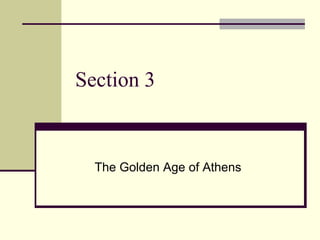
C:\Fakepath\Section 3
- 1. Section 3 The Golden Age of Athens
- 2. The Persian Wars 499 B.C. Persian armies set out to conquer Egypt & surrounding lands More land = more power Captured Africa & Asia Minor (Greek colonies) Greek colonies revolted, but failed 490 B.C. Darius I, Persian king, sent soldiers towards Athens Athens had helped colonies fight Persians Athenians w/ fewer soldiers defeated the Persians at Marathon A messenger ran to Athens from Marathon to tell of the victory How long distance race the marathon got its name 485 B.C. Darius died 480 B.C. Darius’s son Xerxes sent 2,000 soldiers & 800 ships to attack Greece Greek city states of Athens, Sparta, & other united Defeated Persians in a sea battle near Salamis After the wars the Greeks banded together to form leagues (groups of allies) for protection Peloponnesian League: led by Sparta Delian League: led by Athens
- 3. The Golden Age 479 to 431 B.C. Greek pride in victory over Persians led to a time of achievement know as the Golden Age Especially the Athenians Led by aristocracy name Pericles Advise was not to overdo anything Ruled w/ assembly of thousands of men Members could speak in assembly & vote Council of 500 chose what would be discussed at each meeting; council, government offices & juries were chosen every year by drawing names from a bowl
- 4. Pericles supported idea of democracy Believed it could be better Felt every citizen, not just wealthy, should have a right to take part in gov’t Ordered public officials & jurors be paid Made up for money lost by not being able to go to regular jobs
- 5. Achievements of the Golden Age Gov’t of Athens made stronger Easier to work in the arts & sciences Gov’t supported them now Architects & builders made Athens more beautiful New temples, gymnasiums, theaters, & other public buildings were built Decorated with murals of Athens’s history Writers like Herodotus recorded Athens past Sophocles wrote tragedies (serious plays) Aristophanes wrote comedies (humorous plays) Scholars were paid to study nature & human life Greatest scientist of time was Hippocrates Showed illness cam from natural causes, not from gods
- 6. The End of the Golden Age Athens & Sparta were unsatisfied & wanted more land & to get rid of the influences of the other city state Peloponnesian League supported Sparta & Delian League supported Athens 431 B.C. Peloponnesian War Lasted 27 years Sparta attacked Attica causing people to move from the countryside into Athens, leading to overcrowding & diseases causing ¼ of Athenian army to die from diseases; including Pericles
- 7. Without Pericles, assembly began following bad leaders called demagogues They made promises they couldn’t keep & led assembly into making foolish decisions Athens surrendered to Sparta in 404 B.C. Assembly was replaced with a Spartan oligarchy After the war great thinkers & teachers were not paid for their work Socrates: taught by asking questions & making students think rather than simply telling them information Used criticism to try to return Athens into its early greatness 399 B.C. Athenian court convicted Socrates of teaching dangerous ideas Sentenced to end his own life by drinking poison
- 8. Plato Student of Socrates’ Disappointed in leaders of Athens Believed leaders should be a good person because good people are just and wise Possible to do so by studying hard & loving wisdom 385 B.C. Plato started the Academy where philosophers could learn the lessons they would need to govern well Plato ideas of citizens Should think, feel, & then take action Right & responsibility to take part in public life Important to be informed, to understand others viewpoints, & responsible for own actions Aristotle Student of Plato Interested in how things were instead of how he would like them Search for knowledge covered subjects of law, economics, astronomy, & sports